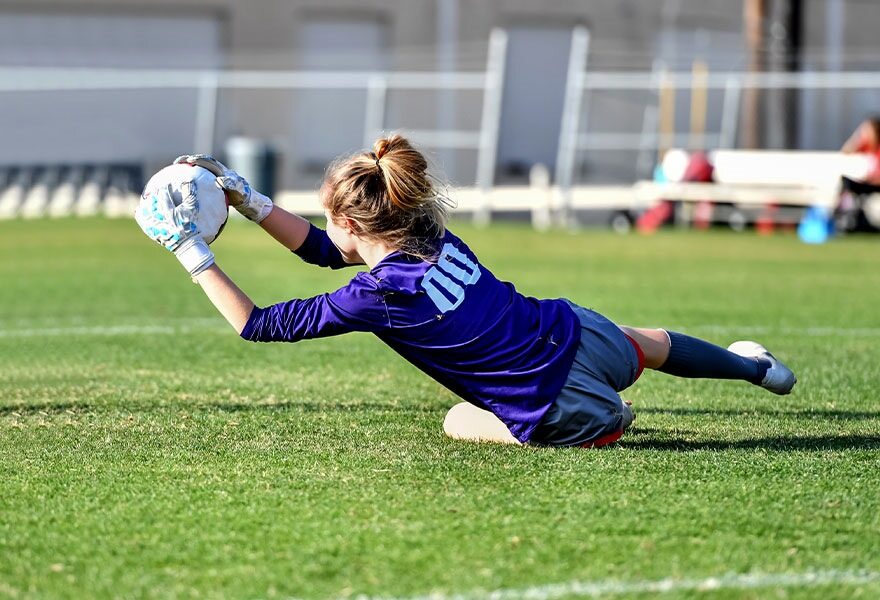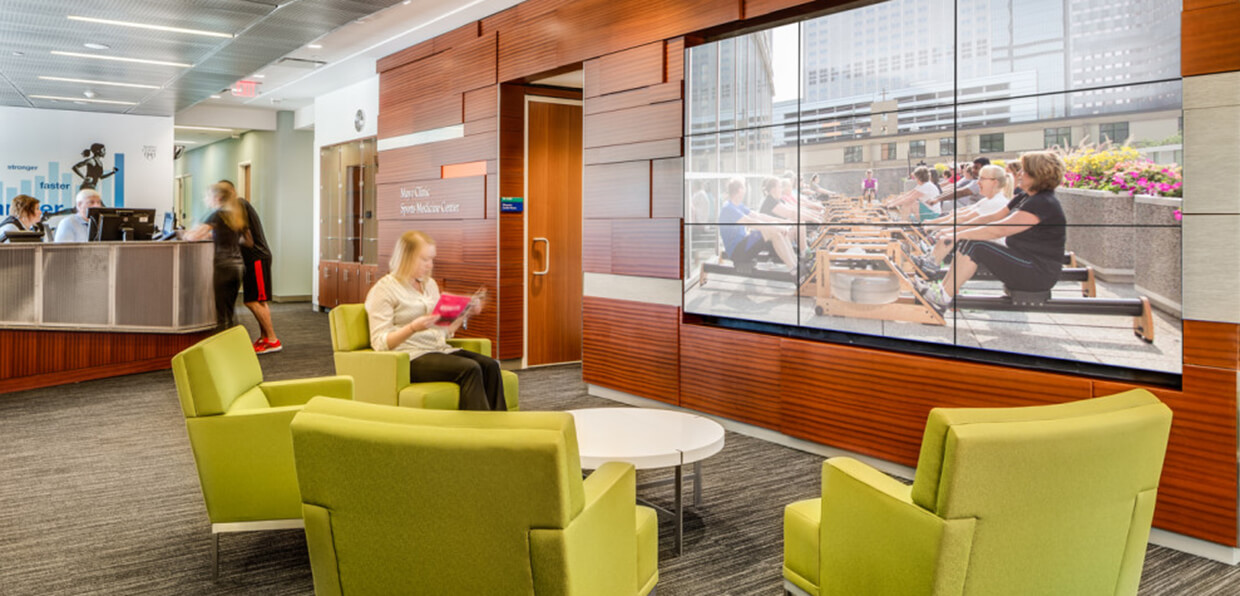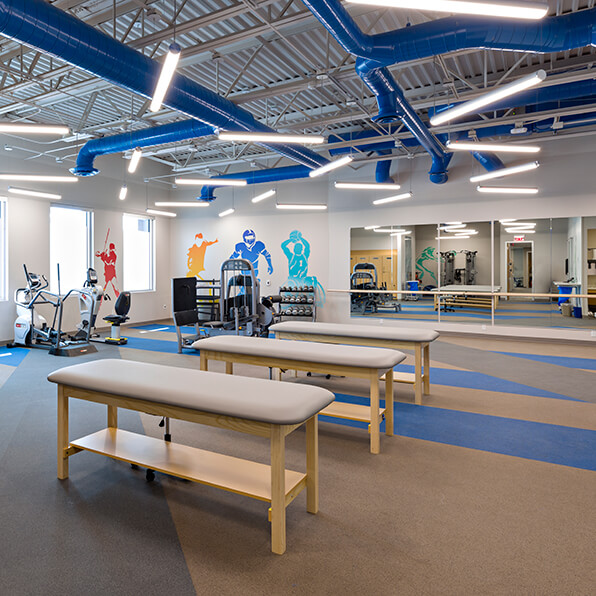You don’t have to be a professional athlete to suffer from knee cartilage injuries, but you still deserve to be treated like one. At Mayo’s Knee Cartilage Specialty Clinic, patients benefit from access not only to the world’s leading experts and researchers on cartilage injuries, but also from new techniques in the area of orthobiologics, regenerative medicine, and restoration surgeries – regardless of their professional or activity status.
Knee cartilage is tissue that lines the ends of the bones in the knee joint, and its job is to make the knee bones glide over each other smoothly when we bend and straighten the knee. Anything that compresses or twists can potentially injure the cartilage, such as a quick movement, cutting and pivoting, or bending the knee deeply. Knee cartilage injuries are most frequently seen in those between the ages of 15 and 30 and above the age of 50.
In addition to acute damage, cartilage can be damaged over time through wear and tear as part of osteoarthritis or can come loose due to damage in the underlying bone. Once the cartilage is injured, it can lead to swelling of the knee, pain, tenderness, and limited movement, or if a piece of cartilage has broken loose, there may be locking or restricted range of motion. Kelechi Okoroha, M.D., orthopedic surgeon, Mayo Clinic Orthopedics and Sports Medicine, team physician for the Minnesota Timberwolves, explains that when you injure the cartilage, it’s kind of like having a pothole on a road. At the Specialty Clinic, we offer procedures that, as Daniel Saris, M.D., Ph.D., orthopedic surgeon, Mayo Clinic Orthopedics and Sports Medicine, describes, “fix a hole in a cartilage defect like you would fix a pothole in the asphalt.”
With a comprehensive team of athletic trainers, physical therapists, operative and non-operative physicians, and on-site radiologists who coordinate a plan just for you, all in one location, the Knee Cartilage Specialty Clinic offers the very best in individualized care to get you back onto the court or field as quickly and strongly as possible.
Tailored treatments based on the right diagnosis
Because a cartilage injury can mimic other injuries within the knee joint, such as a meniscus tear, for example, it may be difficult to diagnose based on history and physical examination alone. Therefore, following the history and exam, further tools are used; an X-ray can rule out other causes of knee pain, such as a fracture or arthritis. Arthroscopy may show a cartilage defect that can explain clinical complaints, and an MRI takes a better look at the joint spaces, “helping define that cartilage and differentiate the location of the cartilage injury,” Elena Jelsing, M.D., sports medicine physician, Mayo Clinic Orthopedics and Sports Medicine, says.
“A solution for one patient may not be a solution for another patient,” explains Aaron Krych, M.D., orthopedic surgeon, Mayo Clinic Orthopedics and Sports Medicine, “so it’s very important to look holistically at that knee joint” and come up with the right diagnosis, the first time. Which is why, Shelby Johnson, M.D., sports medicine physician, Mayo Clinic Orthopedics and Sports Medicine says, “Treatment really depends on the patient, the factors related to the patient, the injury, and what the patient may want to get back to in terms of their activity.” Generally, there are two treatment paths, the surgical and the non-surgical. At the Knee Cartilage Clinic, we create a program that takes you on the path that doesn’t just get you back on the field or court faster or reduce injury risk but also provides long-term care.
Non-operative management of cartilage injuries often starts with physical therapy to help strengthen the muscles around the knee joint. “We give our patients the everyday equipment that is used by the Timberwolves,” says Dr. Okoroha. This includes an anti-gravity treadmill, HydroWorx pool, and the motion analysis lab that allows us to test movement pattern and gait.
Cartilage restoration and repair
Mayo Clinic researchers and specialists are at the forefront of biological joint repair and joint preservation techniques and are working on developments that aim to improve the body’s own capacity to heal, including regenerative medicine, advanced accelerated rehab, and minimally invasive cell-based technologies. Dr. Saris says, “we use clinical care and research-driven innovation to make sure we can improve the way we take care of patients in the future.”
Injections:
One area of non-operative treatment involves ultrasound guided injections. “Regenerative medicine,” Dr. Johnson says, “is essentially an umbrella term for the majority of the injections we do here.” We have specialists in non-surgical treatment with orthobiologics such as PRP (platelet rich plasma) and stem cell injections that aim to improve cartilage and overall function and health of the joint. Corticosteroid injections are not commonly used because their long-term efficacy in treating cartilage damage has not been proven.
Surgery:
Depending on what surgical treatment may be needed, whether to repair or restore the cartilage, we offer arthroscopies which allow us to do a minimally invasive surgery that gets you back on the field or the court quicker, or open procedures where we can transfer the patient’s own cartilage or cartilage from a cadaver.
Patients are front and center in everything we do, and at the Knee Cartilage Specialty Clinic, we utilize cutting edge, scientifically proven knee cartilage repair and restoration techniques to get you back on the court or field as quickly as possible. Contact the Knee Cartilage Specialty Clinic in Minneapolis, MN or Rochester, MN today to find out how we can help get you on the path to recovery.
For more information, or to make an appointment, please visit sportsmedicine.mayoclinic.org.






